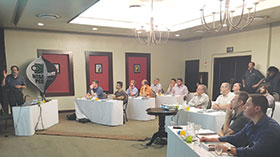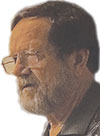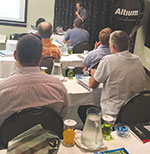

For someone who played a part in sending the first men to land on the moon, Lee Ritchey is remarkably down to earth, as I discovered during a casual but very interesting interview with him.
Ritchey’s résumé spans more than four decades designing high-speed PCBs for supercomputers and high-performance Internet products. His schedule nowadays sees him trekking the globe providing training and consulting on signal integrity, PDS design and EMI control. He has also written two high-speed design books (‘Right the first time,’ volumes 1 and 2) as well as articles on high-performance PCB laminates.

But what made this interview truly unique and exciting was the opportunity to shoot the breeze with one of the few people alive who worked on Apollo 11, the NASA project that landed Neil Armstrong and Buzz Aldrin on the moon on 20 July 1969. The company Ritchey worked for at the time developed the radios that communicated between the Kennedy Space Centre in Houston, Texas, and the equipment (called the Early Apollo Scientific Experiment Package, or EASEP) the astronauts unloaded to gather data from the lunar surface.
As an engineer speaking to another engineer, and conscious of the fact that I would be writing this report for Dataweek, I felt obliged to ask technical questions. As you’d expect from a man who’s been around since the dawn of the IC era, he has remarkable insights on technologies that span the electronics spectrum.
Among the topics we discussed were the astounding evolution of IC integration and miniaturisation, their manufacturing techniques and yields; the leaps in processing and communication speeds; and the fact that we take it all for granted. As Ritchey pointed out, today’s average pocket-sized smartphone packs more sophisticated wireless technology than the considerably larger and heavier radios that were carried by the Apollo spacecraft.
However, I must admit to being guilty of asking a disproportionate number of questions that betrayed my personal interest in the historical and scientific significance of the Apollo project.

On 12 April 1961, Soviet cosmonaut Yuri Gagarin became the first person to fly in space, and in so doing landed a hammer blow to the USA’s national psyche by taking the lead in the so-called ‘Space Race’ between the cold-warring nations. This so displeased US president John F. Kennedy that just six weeks later, in a speech to Congress, he made a now famous proclamation of his country’s intent to stage a reverse in the galactic grudge match. “I believe that this nation should commit itself to achieving the goal, before this decade is out, of landing a man on the moon and returning him safely to the earth,” he stated. In a later speech at the Manned Spacecraft Centre, he went on to say: “No nation which expects to be the leader of other nations can expect to stay behind in this race for space. ... We choose to go to the moon in this decade and do the other things, not because they are easy, but because they are hard.”
With characteristic humility, Ritchey related to me the patriotic determination shared by everyone working on the project – even down to the scientists and engineers, who are often stereotyped as being cold and clinical by nature. By golly, they could not – would not – let down the Man in the White House, and they were going to show those Russians a thing or two. Which they did, with only a few months to spare before the 1960s were relegated to the pages of history.
I wish I could tell you that Ritchey flew out here just to spend some time chatting with me, but the real reason for his visit was to present seminars on high-speed design, and the man who deserves the credit for luring him to SA is Nechan Naicker, the managing director of EDA Technologies. The four-day courses, which incorporated an optional one-day Altium Designer 16 high-speed application session, were held in Pretoria and Cape Town during the first two weeks of March.
According to Naicker, attendance at the seminars was impressive in terms of not only numbers but also engineering talent. This was the latest in EDA Technologies’ long-term commitment to providing training courses for the local electronic engineering sector, presented by domestic experts as well as overseas specialists.
South Africa may not hold the distinction of having won, or even participated in, the Space Race, but we can be proud of the fact that Ritchey, in his debrief, went so far as to say that ours was the best group of engineers he has ever trained.
| Tel: | +27 11 543 5800 |
| Email: | malckey@technews.co.za |
| www: | www.technews.co.za |
| Articles: | More information and articles about Technews Publishing |

© Technews Publishing (Pty) Ltd | All Rights Reserved